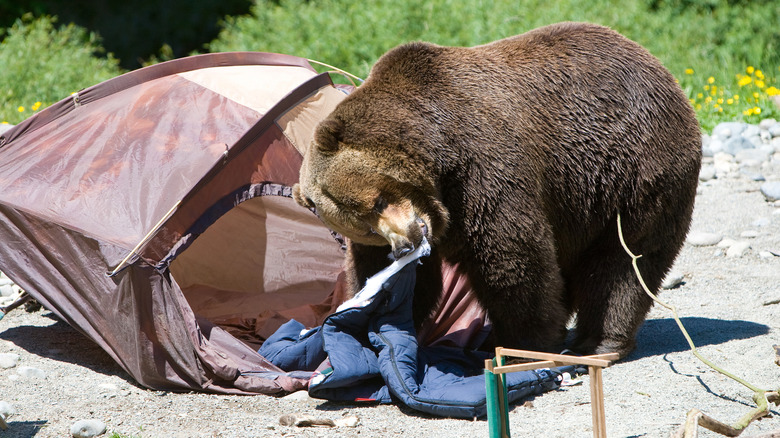How To Choose The Right 'Bear Bag' For Safer Camping
The last thing you want after a long day hiking the trails is to find a massive bear rooting through your things. To avoid having your stuff end up as a bear snack, you should know how to bear-proof your campsite. A lot of people choose bear bags for this. To choose the right bear bag, look into the regulations where you will be camping, find out what wild animals live there, decide which features are most important to you, and seek out bear bags that perform well in field tests. You might want to try an odor-proof or bear-resistant bear bag, or a combination of the two.
Some (including guide Andrew Skurka) argue that there's little value in bear bags of any kind, because they can be difficult to place correctly, an appropriate location may not always be available, and some bears are surprisingly good at getting snacks from tricky locations. However, if you're not willing to carry a heavy, bulky bear canister, it's a lot better to take along a bear bag than to do nothing to deter wild animals.
Some routes and regions, from the iconic but dangerous West Coast thru-hiking route of the Pacific Crest Trail to easy Yosemite National Park trails, require bear canisters and don't allow hanging bear bags (per the National Park Service), but hikers and backpackers often prefer to use them since they're lightweight and flexible. If you decide that a bear bag is right for you, make sure to choose the one that is right for your camping trip and provides you with the protection that you need to stay safe in the wild. Even if you're camping in one of the states with the least amount of bears, you should still consider a bear bag — you probably don't want coyotes, raccoons, or rats rummaging around your tent, either.
Choosing the best bear bag for your camping trip
The most frequently recommended options that we saw on social media — including in Reddit subreddits like r/backpacking, r/camping, r/camping gear and blogs like Section Hiker and Skurka Adventures — were dry bags, odor-blocking bags, and Ursack brand bags. All of these have their uses, but which one you choose should come down to what you need them to do and how well they have been proven to do it. For instance, using a dry bag will keep your items safe from rain, but it won't do much to deter bears.
If you are most worried about attracting bears to your campsite at all, you should choose odor-proof bags designed to make your supplies less attractive to bears. YouTuber Kevin Outdoors has tested some of these and found that his local black bears seemed largely uninterested in food stored in Opsak, Coghlan's, and simple Ziploc bags — however, the bears seemed to understand that there was food nearby, which is a reminder that these bags aren't always foolproof.
If you are more worried about keeping nearby animals out of your bag so that they don't get a taste for human food, you want a bear-resistant bag. Kevin Outdoors also tested Ursak brand Kevlar bags, designed to be difficult for bears to tear into with their powerful claws and teeth. In his trial, bears, raccoons, a lynx, a coyote, and a marten all showed interest in the bag but were unable to access the food. The best solution might be placing an odor-proof bag in an Ursak, so that animals are less likely to be attracted to it in the first place, but if they do come, they won't be rewarded by getting a tasty treat.

